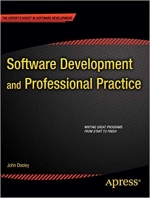Software Development and Professional Practice by John Dooley

Категория: Other
Поделиться:
Software Development and Professional Practice reveals how to design and code great software. What factors do you take into account? What makes a good design? What methods and processes are out there for designing software? Is designing small programs different than designing large ones? How can you tell a good design from a bad one? You'll learn the principles of good software design, and how to turn those principles back into great code.
Software Development and Professional Practice is also about code construction—how to write great programs and make them work. What, you say? You've already written eight gazillion programs! Of course I know how to write code! Well, in this book you'll re-examine what you already do, and you'll investigate ways to improve. Using the Java language, you'll look deeply into coding standards, debugging, unit testing, modularity, and other characteristics of good programs. You'll also talk about reading code. How do you read code? What makes a program readable? Can good, readable code replace documentation? How much documentation do you really need?
This book introduces you to software engineering—the application of engineering principles to the development of software. What are these engineering principles? First, all engineering efforts follow a defined process. So, you'll be spending a bit of time talking about how you run a software development project and the different phases of a project. Secondly, all engineering work has a basis in the application of science and mathematics to real-world problems. And so does software development! You'll therefore take the time to examine how to design and implement programs that solve specific problems.
Finally, this book is also about human-computer interaction and user interface design issues. A poor user interface can ruin any desire to actually use a program; in this book, you'll figure out why and how to avoid those errors.
Скачать
Комментарии